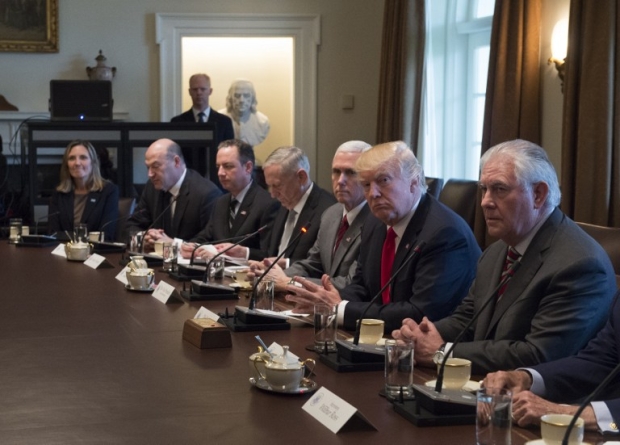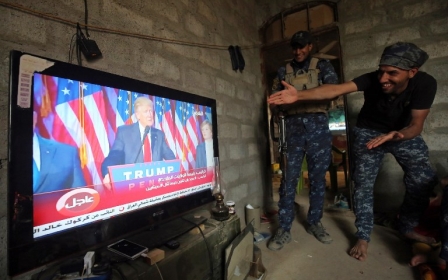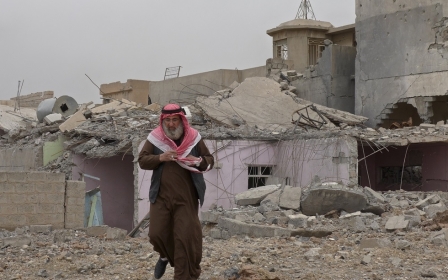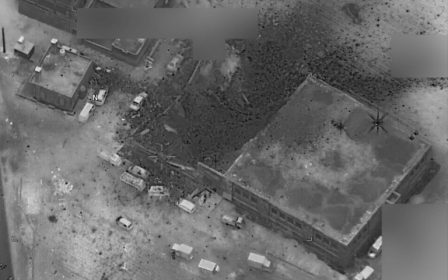Trump versus Islamic State: Three questions US president still needs to answer
"I know more about ISIS than the generals do," scoffed Republican presidential candidate Donald Trump with characteristic vainglory.
That was back in 2015, and since then, Trump has titillated curiosity with veiled mention - hedged with vague promise - of a “secret” and “foolproof” plan to defeating Islamic State (IS) group.
It is now apparent that President Trump deemed confidentiality of the plan to be of such a high level, that he could only share it with himself, and upon assuming the Oval Office, called for the Pentagon to get on with drafting its own.
Evidentially, the president does not think that American statecraft calls for much in the way of checks and balances - either that or there never was a plan, and one more Trumpian lie is unfurled.
Essentially, this consists of the continued bombing of IS positions in Syria and Iraq, sending more US military personnel in for "advise and assist" roles by removing Obama era "troop caps", and beefing up material support for local forces battling to take the group’s de-facto capitals in Syria and Iraq.
Perhaps the mild refashioning of tried-and-tested strategy is symptomatic of the infertile minds that occupy military circles, unable - or unwilling - to produce new and innovative plans outside of the monomaniacal American tradition of relying on air strikes. On the other hand, perhaps Pentagon strategists genuinely see this as the best possible policy for delivering the coup de grace to IS.
But if it is the latter, and Trump wants to place higher troop numbers and intensified arming of the opposition at the fore of his counter-IS policy, then in order to dodge the allegations of negligence that harassed Obama’s Syria policy, the president will need to answer a few serious questions.
An end to Obama’s ‘no boots on the ground’ era?
Firstly, has Obama’s "no boots on the ground" policy been smothered on an obscure office floor somewhere in the Pentagon? The former president’s position towards deploying US troops in Syria was grounded in an unabashed assurance that large US ground forces must be avoided at all costs, which was ensured by a cap on the number of troops the US could send to Syria. Currently, the cap keeps the number to 503.
Has Obama’s ‘no boots on the ground’ policy been smothered on an obscure office floor somewhere in the Pentagon?
But being a smooth operator, Obama was able to manoeuvre between being publicly firm on "no boots on the ground" while simultaneously dispatching special operations units to both Iraq and Syria. As I write, Trump has already sent squadrons of US Army Rangers to Manbij in northern Syria, and planted Marines in the vicinity of Raqqa, where they are flying the stars and stripes.
A major test for the Trump administration will be whether it can tactfully send enough of its men on "advise and assist" missions to make a material difference on the battlefield. At the same time, Trump will need to be cognisant of the volatility inherent in dispatching forces overseas. Sending too large a number could make it difficult to contain the objective, causing "mission creep" to set in, risking a shift in the role of the troops from "advise" to combat.
Alas, as has been shown to us through his innumerable displays of bigotry, tact and delicacy are not Trumpian qualities. Despite that, senior military types continue to trade on the official language of optimism. According to Operation Inherent Resolve Spokesman Col John Dorrian, coalition support is accompanying the Syrian Manbij Military Council forces “as they provide security to the people of Manbij and restore local governance and public works to the city".
The question of how many troops the Trump administration will commit to the effort in Syria and Iraq was really made no clearer after Secretary of State Rex Tillerson’s hosting of the "Coalition to Defeat ISIS" this week. While Tillerson trumpeted all of the right strongman notes, saying that defeating IS is his State Department’s “top priority”, diplomats were left none the wiser as to what shape Trump’s counter-IS strategy will assume.
Some have apparently ventilated their consternation at the US’s slothfulness already, with one senior Arab diplomat reported as saying, “the administration is saying the right things, but the broader strokes have not morphed into a strategy yet".
Who will fight IS with the US?
If the Trump administration continues to pursue this Obama-era policy, then it must do so within the maelstrom of the Syrian battlefield, where local ethno-religious, nationalist, regional, and international alliances can change with breakneck fluidity, and strange bedfellows are made.
The plan is to intensify the Obama-era programme of providing material support for anti-IS groups and coalitions on the ground. This means Trump will have to skilfully navigate the spectrum of opposition groups slated for support to ensure that artillery does not end up in the wrong hands. This is an ever-present concern, but the Joint Chiefs and Washington policy wonks seem to have a better grasp of which opposition groups to support after learning from mistakes made under the Obama administration’s train-and-equip programme.
A big part of Tillerson’s role will be to avoid sacrificing the US-Turkish relationship for an easier victory in Raqqa by supporting the Kurds
It appears the chief problem is not logistical, but in fact diplomatic: how does the US reconcile its support for the Syrian Kurdish People’s Protection Units (YPG) with the demands of NATO ally Turkey that it stop?
Turkey sees the Syrian Kurdish groups as terrorists in cahoots with the outlawed Turkish Kurdistan Workers Party (PKK) which has been intermittently waging guerrilla war against the Turkish state since the late 1970s. At the same time, the US military leadership sees the YPG as the most effective and battle-tested force on the ground against IS. The significance of the Kurds as a US ally increased exponentially when Obama declared that the war against IS would be “by, with, through” local soldiers.
At the tail-end of February, Turkish Prime Minister Ahmet Davutoglu said of the US’s support for Kurds that, “the only thing we expect from our US ally is to support Turkey with no ifs or buts,” and earlier this month, President Erdogan’s government ruled out compromise with the Trump administration over its support for Kurdish fighters.
In other words, Turkey is making implicit threats that it does not want to see Kurds involved in the fight for Raqqa and that if they are, US-Turkey relations will take a battering. However, Trump has already made his intentions clear that the US has every intention of supporting “local groups”. While the Kurds are by no means the only local group, they have certainly been a reliable US favourite.
If the US is to continue sending largesse to the YPG, then Secretary of State Tillerson will have some questions of his own to answer, namely as the chief US diplomat how he intends to placate the increasingly megalomaniacal Erdogan. A big part of Tillerson’s role will be to avoid sacrificing the US-Turkish relationship for an easier victory in Raqqa by supporting the Kurds.
As Tillerson has not yet bothered to mention how he will reconcile divisions over Syria with Turkey, we will have to see how he weathers that diplomatic storm when he visits Ankara at the end of the month. Until then, we again have the somehow unconvincing words of, once again, the Operation Inherent Resolve spokesman, “we talk to Turkey through military channels and I believe at diplomatic levels every day”.
And after Raqqa?
We know that throughout his presidential bid and since, Trump has campaigned on a platform to “end the era of nation-building”. But what of the areas ravaged by US Air Force strikes? Does the administration plan to preside over the reducing to smouldering slag heaps parts of Raqqa and Mosul, and then pack up and leave?
Tillerson has said that once areas are stabilised, “local leaders and local governments will take on the process of restoring their communities in the wake of ISIS with our support".
Does the administration plan to preside over the reducing to smouldering slag heaps parts of Raqqa and Mosul, and then pack up and leave?
Naturally, local people will set out to restore their communities upon being liberated from their tormentors. This can hardly be credited to US foreign policy. What will make a difference is what kind of support the US will provide, and whether Trump will be able to balance on the tightrope between helping communities rebuild while avoiding a return to the days of nation-building.
Senior officials, such as Chairman of the Joint Chiefs of Staff General Joseph Dunford, have said that the Pentagon’s plan for post-IS Syria will also include mechanisms to help address “the grievances of the civil war, [and] safety and humanitarian assistance that needs to be provided to people”. These are soft-power objectives that would need to be pursued through diplomatic avenues with representatives from the other states involved in the conflict, particularly Russia, Iran and Turkey. So another job for Tillerson and the State Department.
One could perhaps be a little more optimistic about this prospect if Trump had not recently suggested slashing the budget of the State Department and the Agency for International Development by 37 percent, while proposing a $54bn defence budget increase. These potential moves provide crystal clear reflections of Trump’s priorities, and suggest that he is unlikely to be concerned by the minutia of post-IS Syrian or Iraqi statecraft.
And so we return to that question that continues to dog the US foreign policy establishment: how do we make sure that the defeat of IS does not open a vacuum wherein a successor organisation can germinate? And how do military officials dovetail their work with the much-needed support of development and diplomacy under an administration that clearly sees the State Department as expendable?
Perhaps Trump will surprise us with that “secret” and “foolproof” plan to defeat IS that he is yet to share. Perhaps he really does know more than the generals and will be able to answer the above questions. Let’s hope so. If not, his counter-IS policy could turn out to be one more calamitous failure to add to the already mounting list.
- Matthew Ayton is a reporter, politics and history lecturer based in Beirut. He has previously reported from the occupied Palestinian territories.
The views expressed in this article belong to the author and do not necessarily reflect the editorial policy of Middle East Eye.
Photo: US President Donald Trump and Defense Secretary James Mattis at a cabinet meeting at the White House on 13 March 2017 (Reuters)
New MEE newsletter: Jerusalem Dispatch
Sign up to get the latest insights and analysis on Israel-Palestine, alongside Turkey Unpacked and other MEE newsletters
Middle East Eye delivers independent and unrivalled coverage and analysis of the Middle East, North Africa and beyond. To learn more about republishing this content and the associated fees, please fill out this form. More about MEE can be found here.






